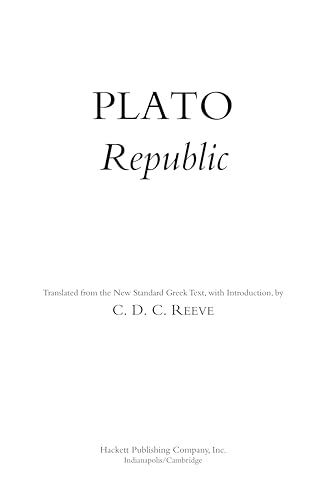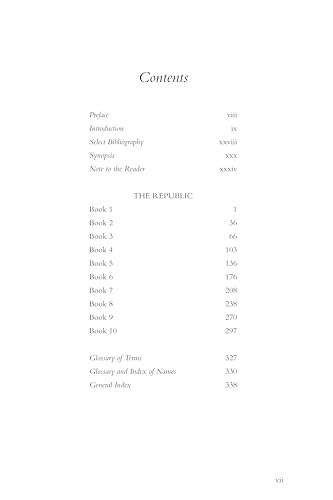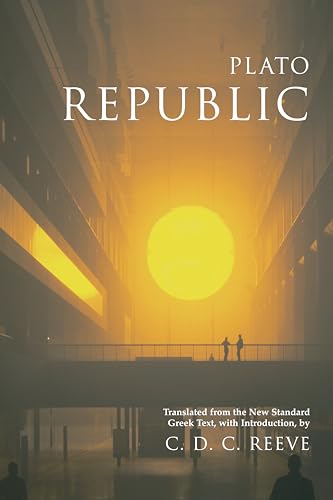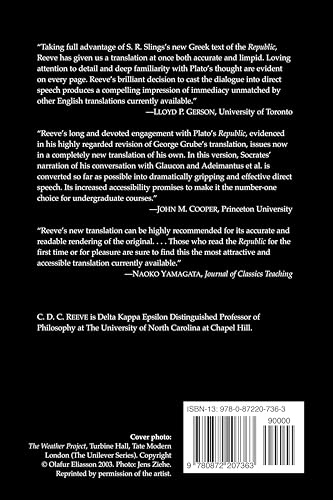Customer Services
Copyright © 2025 Desertcart Holdings Limited








Republic (Hackett Classics) [Plato, C. D. C. Reeve, C. D. C. Reeve] on desertcart.com. *FREE* shipping on qualifying offers. Republic (Hackett Classics) Review: Men in Togas (Cloaks) Discuss Today's Issues - Plato's Republic is a challenging and exciting book, the first title on the Columbia College Contemporary Civilization Reading List. I've often heard that much of Western thought is a footnote to Plato and Aristotle. By reading this full work, the reader, even if otherwise unfamiliar with these giants, will start to see why Plato is important. While challenging in content, it's a fun read because the manner of speaking is often ironic and informal, as if the men are enjoying an after dinner discussion while downing a few brandies. In the translator's preface, we find out that this book, as a "dialogue", is recounted by Plato as a conversation between Socrates and others, and not simply as a report by Plato of what Socrates told him. The reader sees that what is seemingly obvious is really a millennia-old strategy developed for readability. This information serves more than to inform technically, by reminding the reader of the good luck to have this record, despite time's passage which has lost many classical works. In the introduction, we learn of Plato's family background and early life: his familiarity with local politics, and his distaste for the political life partly due to the execution in 399 BCE of his mentor, Socrates. This background helps frame and inspire the philosophical quest of The Republic, to find out and explain how one should live in order to be happy. Particularly, Socrates investigates whether it is better to be "just," or to gain the advantages of being immoral while also taking advantage of a reputation for being moral. Sections of the introduction that outline the Republic's thesis, and that summarize Plato's ideas (e.g., of forms) provide general knowledge and also help guide us through the text's often indirect arguments. Much of the discussion between Socrates and the others, usually Plato's brothers, is about a "kallipolis," or beautiful city. This is a city-state that would be ruled, protected, and supported, by the best-suited individuals, in both native ability and training: gold, silver, and bronze. Readers will vary in their agreement with Plato's ideas (e.g., infanticide of the unfit, and telling only favorable stories about the gods) and assumptions, such as the superiority of homogeneity over variety. I found my enjoyment of these points to be as much in the manner of speaking between the men - irony and sarcasm among lofty topics - as on finding convincing or insightful arguments, though these are also made. The modern reader may too easily be tempted to smugness, and then remember more recent superstitions supporting religious, racial, and gender bias. The men discuss ideas that have shone through the ages, and are worth our reflection in daily life. For example, in Book 2, imagine that there are different kinds of lies, some useful and essentially good, and some evil. Are we ever misled for our own good? For the support of a war to protect national interests that we may otherwise not accept, or so we have confidence in our large financial institutions? Plato envisioned situations like these and identified them as merely lies in words, and thus not as evil. Lies that are evil are "true lies" that can lead someone truly away from goodness. As another example, in Book 7, the men consider whether it is ever too soon for a person to learn argumentation because without wisdom, he will become attached to disputation. In this respect, do we ever win only for the sake of winning, regardless of the truth of our contention? Or, have you ever asked anyone if they've lived in a cave, such as a cave of ignorance? Remembering your first job, and feeling the need to get along with a social clique, was it ever necessary to understand the views of those who saw only shadows against a wall? It's all here, in Book 7, dramatized, including the initial ache of discovery and the criticism by the cave-dwellers of those who have escaped seeing only the shadows. And what about the "body politic"? Is this just a convenient media phrase? Books 8 and 9 discuss various forms of government - e.g., oligarchy, democracy, and tyranny - and how they evolve from one to the other. They describe the sort of individual that embodies each of them. So, while perhaps a cute metaphor, it is one that originated among the ancients. This edition contains other sections: a select bibliography, a synopsis for each of the ten books, a glossary of terms, a glossary and index of names, and a general index. The many footnotes provide either explanation (e.g., a reference to another classical work) or a text reference as identified in the column. In addition to the drama of the ideas, and the privilege of learning at the knee of a giant, there is a lot of help here for the ambitious reader. Review: Nice book, great for college - Perfect for my intro to philosophy class
| Best Sellers Rank | #3,348 in Books ( See Top 100 in Books ) #11 in Political Philosophy (Books) #14 in History & Theory of Politics #16 in Ancient Greek & Roman Philosophy |
| Customer Reviews | 4.5 4.5 out of 5 stars (500) |
| Dimensions | 6 x 1 x 8.75 inches |
| Edition | First Edition |
| ISBN-10 | 0872207366 |
| ISBN-13 | 978-0872207363 |
| Item Weight | 2.31 pounds |
| Language | English |
| Print length | 392 pages |
| Publication date | September 15, 2004 |
| Publisher | Hackett Publishing Company, Inc. |
C**I
Men in Togas (Cloaks) Discuss Today's Issues
Plato's Republic is a challenging and exciting book, the first title on the Columbia College Contemporary Civilization Reading List. I've often heard that much of Western thought is a footnote to Plato and Aristotle. By reading this full work, the reader, even if otherwise unfamiliar with these giants, will start to see why Plato is important. While challenging in content, it's a fun read because the manner of speaking is often ironic and informal, as if the men are enjoying an after dinner discussion while downing a few brandies. In the translator's preface, we find out that this book, as a "dialogue", is recounted by Plato as a conversation between Socrates and others, and not simply as a report by Plato of what Socrates told him. The reader sees that what is seemingly obvious is really a millennia-old strategy developed for readability. This information serves more than to inform technically, by reminding the reader of the good luck to have this record, despite time's passage which has lost many classical works. In the introduction, we learn of Plato's family background and early life: his familiarity with local politics, and his distaste for the political life partly due to the execution in 399 BCE of his mentor, Socrates. This background helps frame and inspire the philosophical quest of The Republic, to find out and explain how one should live in order to be happy. Particularly, Socrates investigates whether it is better to be "just," or to gain the advantages of being immoral while also taking advantage of a reputation for being moral. Sections of the introduction that outline the Republic's thesis, and that summarize Plato's ideas (e.g., of forms) provide general knowledge and also help guide us through the text's often indirect arguments. Much of the discussion between Socrates and the others, usually Plato's brothers, is about a "kallipolis," or beautiful city. This is a city-state that would be ruled, protected, and supported, by the best-suited individuals, in both native ability and training: gold, silver, and bronze. Readers will vary in their agreement with Plato's ideas (e.g., infanticide of the unfit, and telling only favorable stories about the gods) and assumptions, such as the superiority of homogeneity over variety. I found my enjoyment of these points to be as much in the manner of speaking between the men - irony and sarcasm among lofty topics - as on finding convincing or insightful arguments, though these are also made. The modern reader may too easily be tempted to smugness, and then remember more recent superstitions supporting religious, racial, and gender bias. The men discuss ideas that have shone through the ages, and are worth our reflection in daily life. For example, in Book 2, imagine that there are different kinds of lies, some useful and essentially good, and some evil. Are we ever misled for our own good? For the support of a war to protect national interests that we may otherwise not accept, or so we have confidence in our large financial institutions? Plato envisioned situations like these and identified them as merely lies in words, and thus not as evil. Lies that are evil are "true lies" that can lead someone truly away from goodness. As another example, in Book 7, the men consider whether it is ever too soon for a person to learn argumentation because without wisdom, he will become attached to disputation. In this respect, do we ever win only for the sake of winning, regardless of the truth of our contention? Or, have you ever asked anyone if they've lived in a cave, such as a cave of ignorance? Remembering your first job, and feeling the need to get along with a social clique, was it ever necessary to understand the views of those who saw only shadows against a wall? It's all here, in Book 7, dramatized, including the initial ache of discovery and the criticism by the cave-dwellers of those who have escaped seeing only the shadows. And what about the "body politic"? Is this just a convenient media phrase? Books 8 and 9 discuss various forms of government - e.g., oligarchy, democracy, and tyranny - and how they evolve from one to the other. They describe the sort of individual that embodies each of them. So, while perhaps a cute metaphor, it is one that originated among the ancients. This edition contains other sections: a select bibliography, a synopsis for each of the ten books, a glossary of terms, a glossary and index of names, and a general index. The many footnotes provide either explanation (e.g., a reference to another classical work) or a text reference as identified in the column. In addition to the drama of the ideas, and the privilege of learning at the knee of a giant, there is a lot of help here for the ambitious reader.
L**Y
Nice book, great for college
Perfect for my intro to philosophy class
B**E
Good for the Teacher and the Beginner
After reading through and teaching from the older Benjamin Jowett translation, I found this work to be much easier to follow and more useful. The next time I teach Plato's Republic, I plan on using this edition. The glossaries of terms and names are also helpful. I am still very much a novice when it comes to this work, but I did feel that it opened the door for a much better understanding.
G**R
Did Plato travel to 2018 before writing this?
While the book was written in 380 BCE it is, perhaps, more relevant today than at any time in its history. You would almost think that Plato had pulled a Dr. Who and transported himself to 2018 before sitting down to write. It couldn’t be more tailored to the political, social, and economic environment in which we currently find ourselves. Plato/Socrates use elenctic (i.e. Socratic) questioning to explore human happiness and the specific virtue of justice. Socrates believed: “by curing people of the hubris of thinking they know when they do not…makes them happier and more virtuous than anything else.” Socrates and his friends pursue this journey by defining the ideal city – Kallipolis—and its rulers and constitution, the idea being that truth is often easier to discern on a large scale (i.e. a city) that can then be applied on a smaller scale (i.e. the individual). The debate focuses on the four virtues of an ideal city—wisdom, courage, temperance, and justice. And results in the conclusion that the human soul is made up of three parts—the appetitive, spirited, and rational—and that virtue, ultimately proven to be the source of happiness exists when the three are in balance and harmony. Socrates ultimately defines five political/economic models—philosopher/king, timocracy, oligopoly, democracy, and tyranny. And he ranks them, from good to bad, in the order listed, essentially arguing that they form an inverse ladder in which one inevitably deteriorates into the latter. That means, in essence, that oligopoly inevitably deteriorates into democracy, which he clearly doesn’t not hold in very high esteem. Freedom, by his logic, is unsustainable. In the simplest terms, the unfettered pursuit of freedom by everyone ultimately leads to conflict and that, in turn, inevitably leads to a race for power defined by manipulation, deception, and injustice. As a result, democracy inevitably leads to tyranny as the ruling class preys—quite deceitfully—on the fears of the masses that they, the masses, are being sidelined and their interests ignored. Sound familiar? The elenctic, commonly known as the Socratic method, has been largely stripped from our political and academic discourse. People are sure of what they know and don’t want to know anything else. The thirst for victory has, as a result, crushed the thirst for knowledge. There are many reasons for this. Technology, which gave rise to the echo chamber, has certainly contributed. Impatience has also played a big role. Elenctic takes time and our collective attention spans have dwindled to near nothing. Education, I believe Plato would say, however, is probably the real culprit. Oppression, sheltering, and victimization have replaced Plato’s definition of the ideal education: physical training, musical training (including prose and speech), mathematics, and dialectic. On the surface, critics will find no shortage of targets in the logic. More than anything else, however, both the argument and any criticism that might be drawn, reflect the imprecision of language itself and the difficultly this presents for philosophers willing to tackle the biggest and most relevant issues of life. That, however, simply reinforces Plato’s encouragement to ask more questions, listen more attentively with an open mind, and never assume you know the real answer. Which is why his ultimate encouragement it seems to me is not to admire things that are beautiful or just, but to truly understand what beauty and justice are. Sadly, I can think of no leader today who is doing anything even remotely close to that. Read it. It will make you a better leader, citizen, parent, friend, and person.
D**R
An excellent translation and edition
This is really the "go to" edition for those looking to enter the world of Plato's Republic. Not only is the translation very clear and accurate (at least from what I can tell comparing other translations and looking at scholarly reviews) but the translation is rendered into direct speech (labeling the speakers) - which means that there will never be any confusion as to who is talking (no small concern for such a large and complex work - even if it is artificial). There are also footnotes at the bottom of the pages that help refer you to other parallel sections of the work, identify the origins of various sayings, and make clear cultural or mythological references. An index and a very helpful and clear introduction round things out - making this the best choice from which to start one's study of the Republic. For me, what really sets this translation apart is its clarity - at every turn Reeve's translation really tries to help the student in this regard; the Republic is complex enough, so why not make it as clear as possible?
P**K
Good product. Satisfied
V**.
Die Ausgabe ist preiswert, sinnvoll konzipiert, sehr gut lesbar und ideal fürs Studium.
A**X
Fantastic book, easy to understand commentary in the beginning with a fine translation of the dialogues. Could do with some cover art aesthetics, if you care about such things.
M**W
Book was bound upside down.
L**R
Item arrived on time. It was described as "new" but it was not pristine by any means. It had a sticker wrapped around the lower spine that took me 15 minutes to take off -- very carefully with a curved exacto knife. And then it did not look good at all. You would never be able to give this as a gift, for instance. But I wanted this edition, and I am willing to live with a less than perfect physical copy.
Trustpilot
1 month ago
1 week ago